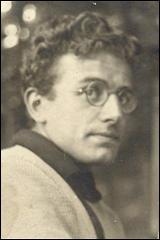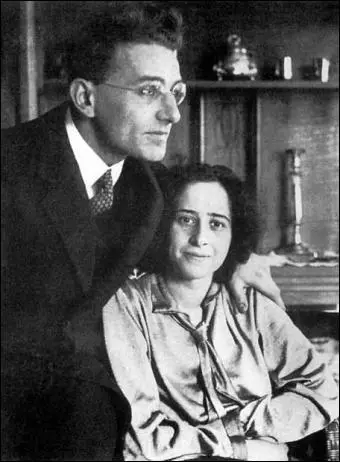Günther Stern

Günther Stern, the son of William Stern and Clara Stern, was born in Breslau on 12th July, 1902. Both his parents were significant figures in the development of child psychology. His cousin was the important philosopher, Walter Benjamin. (1)
Stern went to University of Marburg to study philosophy under Martin Heidegger. One day the Heidegger family and a group of philosophy students went for a hike and a picnic lunch in the Black Forest. They held an athletic competition and Günther Stern, was an easy winner. Martin's wife, Elfride Heidegger, was very impressed with this young man who she already knew to be a very fine musician, as well as a talented student in philosophy and literature. At the end of the day Elfride told Stern that he was an exceptional specimen of humanity and that such a young man ought to be a member of the Nazi Party. He replied that as he was Jewish he did not think the party would have a place for him. (2)
Stern was at university with Hannah Arendt. However, she moved on to the University of Heidelberg. Stern met Arendt again in Berlin in January 1929 at a fancy-dress ball, where she was dressed as an Arab harem girl. Within a month they were living together and in September they were married. Hannah's mother liked her new son-in-law, and very much hoped the couple would have children; but the marriage was destined to last only a few years. (3)

Hannah Arendt remained in love with her former teacher, Martin Heidegger. A few days before the wedding, Arendt wrote to Heidegger telling him that the continuity of love between the two of them was still the most meaningful thing in her life: "Do not forget how much and how deeply I know that our love has become the blessing of my life. This knowledge cannot be shaken, not even today... I would indeed so like to know - almost tormentingly so, how you are doing, what you are working on, and how Freiburg is treating you." (4)
Soon after their marriage, the couple went to live in Frankfurt, where Stern wanted to submit a thesis that would enable him to become a university lecturer. This brought the couple into contact with the Frankfurt School, a group that included Erich Fromm, Walter Benjamin, Herbert Marcuse, Max Horkheimer, Theodor Adorno, Otto Kirchheimer, Leo Löwenthal, Friedrich Pollock, Henryk Grossman, Ernst Bloch and Franz Leopold Neumann. "Their main preoccupation was to produce a Marxist-based analysis of the effects of capitalist economic relations on culture and thought. They all saw bourgeois capitalist society as enforcing different kinds of rigid mental tyranny on both employers and workers, and thought that a Marxist society would give freer range to the flexibility and imagination of the human mind." (5)
On 4th January, 1933, Adolf Hitler had a meeting with Franz von Papen and decided to work together for a government. It was decided that Hitler would be Chancellor and Von Papen's associates would hold important ministries. "They also agreed to eliminate Social Democrats, Communists, and Jews from political life. Hitler promised to renounce the socialist part of the program, while Von Papen pledged that he would obtain further subsidies from the industrialists for Hitler's use... On 30th January, 1933, with great reluctance, Von Hindenburg named Hitler as Chancellor." (6)
Günther Stern watched these events with great concern but it was the Reichstag Fire on 27th February, 1933, after which Hitler ordered the arrests of leading members of the German Communist Party (KPD) and Social Democratic Party (SDP), that convinced him and Hannah Arednt to leave Nazi Germany: "The burning of the Reichstag, and the illegal arrests that followed the same night. The so-called protective custody... This was an immediate shock for me, and from that moment on I felt responsible. That is, I was no longer of the opinion that one can simply be a bystander." (7)
Günther Stern, who was aware that the Nazis knew he was close to Bertolt Brecht, decided to flee immediately fled to Paris. Arendt stayed with the idea of helping in some way. Arendt eventually decided to help the German Zionist Federation in collecting materials that would show the extent of anti-Semitism in all aspects of German society. Her research involved risk as the new government had already passed a law that criminalized criticism of the state. Her activities were detected and she was arrested in the spring of 1933 and held at police headquarters for eight days. (8)
Arendt was able to develop a good relationship with the man who arrested her: "I got out after eight days because I made friends with the official who arrested me. He was a charming fellow! He'd been promoted from the criminal police to a political division... Unfortunately, I had to lie to him. I couldn't let the organization be exposed. I told him tall tales, and he kept saying, 'I got you in here. I shall get you out again. Don't get a lawyer! Jews don't have any money now. Save your money!' Meanwhile the organization had gotten me a lawyer. .. And I sent the lawyer away. Because this man who arrested me had such an open, decent face. I relied on him and thought that here was a much better chance than with some lawyer who himself was afraid." (9)
As soon as Hannah Arednt was released she crossed into Czechoslovakia by night and then traveled on to Paris where she rejoined her husband. Although they lived together Hannah wanted a divorce. She found his depression and pessimism hard to bear. However, Stern wanted the marriage to continue, and she chose not to walk out on him, however, she did have relationships with other men, including Heinrich Blücher. (10)
Hannah Arednt later told Blücher: "I wanted to dissolve my marriage three years ago - for reasons which I will perhaps tell you someday. My only option. I felt, was passive resistance, termination of all matrimonial duties. It seemed to me that that was my right; but nothing else. Separation would have been the most natural outcome for the other party. Which the other party, however, never thought necessary to opt for." (11)
The couple eventually got divorced in 1937 and Stern decided to move to the United States with his parents. Hannah Arednt remained in France and married Blücher was eventually released and the couple married on 16th January, 1940. At the beginning of May, with the French government expecting a German invasion, ordered that all Germans except the old, the young, and mothers of children report as enemy aliens to internment camps, the men at Stadion Buffalo and the women at the Velodrome d'Hiver. Arendt observed: "Contemporary history has created a new kind of human beings - the kind that are put into concentration camps by their foes and in internment camps by their friends." (12)
The German Army invaded on 10th May, 1940, Arendt rightly predicted would soon be turned over to the Germans. She therefore decided to escape from the camp. Those that remained were later deported to Auschwitz. She walked for over 200 miles to Montauban, a meeting point for escapees. Blücher also escaped from his camp during a German air-raid. They were hidden by the parents of Daniel Cohn-Bendit until friends in United States, including Günther Stern, managed to obtain emergency visas for the couple. (13)
Günther Stern, who was also known by the name Günther Anders, lectured at the New School for Social Research. In 1945 he married Elisabeth Freundlich. Five years later the couple moved to Vienna. His main philosophical work was the The Obsolescence of Humankind (1956), and he became a leading figure in the anti-nuclear movement. The following year he married the American pianist Charlotte Lois Zelka.
Günther Stern died in Vienna of lung cancer, on 17th December 1992.
Primary Sources
(1) Derwent May, Hannah Arendt (1986)
In 1929 she (Hannah Arendt) married for the first time. The man she married was another highly intelligent young German Jew, Günther Stern - a kindly man, the son of two progressive child psychologists who were well known in Germany. Hannah had been acquainted with him in Marburg in 1925, and they met again in Berlin in January 1929 at a fancy-dress ball, where she was dressed - in her usual provocative way - as an Arab harem girl. Hannah and Günther lived together in Berlin for several months - he helped with the final revision of her doctoral thesis - and they were married in September. Hannah's mother liked her new son-in-law, and very much hoped the couple would have children; but the marriage was destined to last only a few years.
(2) Günther Stern, The Obsolescence of Humankind (1956)
It does not suffice to change the world. We do that anyway. And to a large extent that happens even without our involvement. In addition we have to interpret this change. Precisely because to change it. That therefore the world does not change without us. And ultimately into a world without us....
With technocracy I do not mean the rule of technocrats (as if they were a group of specialists, who dominate today's politics), but the fact, that the world, in which we live and which determines us, is a technological one - which extends so far, that we are not allowed to say, that in our historical situation there is among other things technology, rather do we have to say: within the world's status called 'technology' history happens, in other words technology has become the subject of history, in which we are only 'co-historical'.
(3) Günther Stern, Notes on the History of Feelings (1986)
Without knights no chivalry, without court no courtliness, without salon no charm, without material support no deference will last indefinitely, not even as make-believe. In the same manner what shrinks in a world that cheats us out of leisure and other preconditions of our privacy, are the subtleties of our emotional private lives.
References
(1) Derwent May, Hannah Arendt (1986) page 29
(2) Hugo Ott, Martin Heidegger: A Political Life (1993) pages 137-138
(3) Derwent May, Hannah Arendt (1986) page 29
(4) Daniel Maier-Katkin, Stranger from Abroad: Hannah Arendt, Martin Heidegger, Friendship and Forgiveness (2010) pages 49-50
(5) Derwent May, Hannah Arendt (1986) page 30
(6) Daniel Maier-Katkin, Stranger from Abroad: Hannah Arendt, Martin Heidegger, Friendship and Forgiveness (2010) page 67
(7) Louis L. Snyder, Encyclopedia of the Third Reich (1998) page 154
(8) Hannah Arendt, interviewed by Günter Gaus (28th October, 1964)
(9) Derwent May, Hannah Arendt (1986) page 38
(10) Hannah Arendt, interviewed by Günter Gaus (28th October, 1964)
(11) Daniel Maier-Katkin, Stranger from Abroad: Hannah Arendt, Martin Heidegger, Friendship and Forgiveness (2010) page 83
(12) Hannah Arendt, The Jew as Pariah: Jewish Identity and Politics in the Modern Age (1978) pages 62-63
(13) Daniel Maier-Katkin, Stranger from Abroad: Hannah Arendt, Martin Heidegger, Friendship and Forgiveness (2010) pages 112-113
